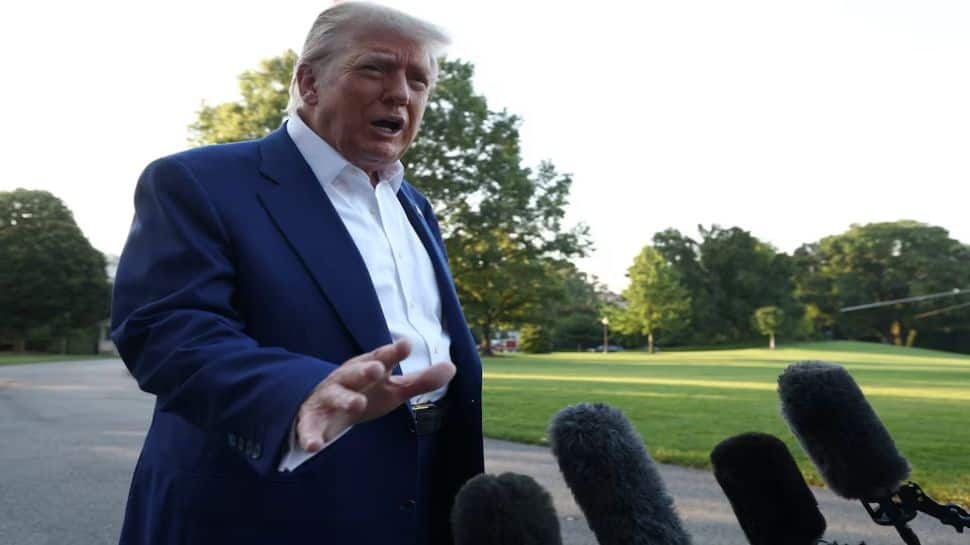Former US President Donald Trump recently made a controversial claim, asserting that no US president before him had ever ended a war. This statement, made during a White House meeting with Ukraine’s President Volodymyr Zelenskyy on October 17, has drawn significant criticism and historical rebuttal. Trump stated that many presidents start wars but do not solve or settle them, especially wars that do not directly involve the United States. He specifically mentioned that former President George W. Bush started the Iraq War but did not end it. According to Trump, his achievements in brokering peace surpass those of his predecessors, a claim that historians and political experts have largely dismissed as inaccurate and misleading.
Historians reacted with disbelief and concern at Trump’s sweeping statement, pointing out that numerous American presidents have played key roles in ending wars and brokering peace agreements. Some of these presidents even received the Nobel Peace Prize for their efforts. Experts say Trump’s remarks dramatically exaggerate his record while ignoring or minimizing the substantial diplomatic successes of past administrations. Despite the backlash, the White House remained supportive of Trump’s claims. Deputy Press Secretary Anna Kelly defended the former president by highlighting his "direct involvement in major conflicts" and his use of America’s military and economic influence to bring peace to longstanding global conflicts in ways unprecedented by earlier presidents.
Importantly, Trump qualified his claim by specifying that he was referring only to wars that the United States was not directly involved in. He excluded major conflicts such as World War II and other battles where American forces were engaged. However, none of the eight conflicts he claims to have helped resolve involved direct American troop deployment, which has led to further scrutiny of the effectiveness and permanence of these peace efforts.
Looking back through history, several American presidents have indeed been instrumental in ending wars and establishing peace accords. In 1905, Theodore Roosevelt played a crucial role in mediating the end of the Russo-Japanese War. The peace talks took place at the Portsmouth Naval Shipyard, and Roosevelt’s efforts earned him the Nobel Peace Prize in 1906. This diplomatic achievement was a landmark in US foreign policy and demonstrated effective conflict resolution.
Fast forward to 1978, President Jimmy Carter facilitated the Camp David Accords, bringing together Egyptian President Anwar Sadat and Israeli Prime Minister Menachem Begin after decades of hostility between their nations. The secret talks at Camp David led to a formal peace agreement that has largely held to this day. Both Sadat and Begin were later awarded the Nobel Peace Prize for their roles in the agreement, with Carter’s mediation being widely praised.
Other presidents also contributed to ending significant conflicts. Bill Clinton oversaw the Dayton Accords in 1995, which ended the brutal war in Bosnia, one of the bloodiest conflicts in Europe’s recent history. The accords were negotiated through intense diplomacy involving US diplomats like Richard Holbrooke and Secretary of State Warren Christopher. Clinton was present in the Oval Office when the final peace agreement was signed. Additionally, Clinton’s administration supported the Good Friday Agreement in 1998, which significantly reduced violence in Northern Ireland, ending decades of sectarian conflict known as "the Troubles." Former Senate Majority Leader George Mitchell led the negotiations, shuttling between Washington and Belfast, with Clinton’s approval.
Under President George W. Bush, the United States helped bring about the Sudan Comprehensive Peace Agreement in 2005, which ended a long-standing civil war between the Sudanese government and the Sudan People’s Liberation Movement. This agreement eventually led to the creation of South Sudan as an independent nation in 2011. The talks were supervised by US Secretary of State Colin Powell, marking another significant peace achievement facilitated by the US government.
In contrast, Trump often claims to have ended six, seven, or even eight wars, citing a series of ceasefires and temporary truces in various global conflicts. These include pauses in tensions between Israel and Iran, India and Pakistan, and Armenia and Azerbaijan. However, none of these ceasefires have resulted in lasting peace, and many involved leaders contest the extent of Trump’s involvement or credit. For example, a temporary peace deal between the Democratic Republic of the Congo and Rwanda brokered with US support quickly unraveled, with violence resuming and causing hundreds of civilian deaths shortly after the June signing.
Similarly, Trump facilitated an agreement between Cambodia and Thailand, but accusations of violations surfaced within weeks. Another ongoing dispute involves Egypt and Ethiopia over the construction of a dam on the Nile River, a conflict that remains unresolved. In

